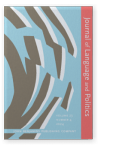Vol. 23:4 (2024) ► pp.565–587
On the language of liberalism
Liberal language ideology in Polish discourse of linguistics (1970–1989) as a form of pro-democratic resistance
In this article, I look at linguistic studies of communist propaganda produced by oppositional scholars in the last two decades of state socialism in Poland. I argue that Polish discourse of linguistics in 1970–1989 was a vehicle for the promotion of liberalism in the People’s Republic of Poland and an important area of political contestation. I demonstrate that Polish linguistic studies of communist propaganda should not be assumed to be “objective” or politically disengaged. Ideas about language detectable in these studies, especially “referentialism”, promote liberal democracy by consistently implying values characteristic of liberalism as a political ideology. In this way, Polish linguists engaged in a form of anti-communist resistance and formulated language policy proposals for the language of liberal democracy. I argue that language ideologies are sometimes systematically related to political ideologies by promoting specific political values or points of view.
Article outline
- 1.Introduction
- 2.Language ideology: Definition
- 3.Data and method
- 4.Thematic analysis of the corpus
- 4.1Depictions of language: Nowomowa “devastates language” and “corrupts thought”
- 4.2Political legitimation: Nowomowa legitimises communism
- 4.3Linguistic norms: Nowomowa is about “ideological correctness” and “manipulation”
- 5.Contextual analysis
- 5.1Co-text: Orwell’s Newspeak
- 5.2Genre analysis: Academic studies and “dissident” polemics
- 5.3The socio-political context: People’s Republic of Poland (1970–1980)
- 5.4Ideological context: Liberalism
- 5.5Retrospective linguistic context: Against “referentialism”
- 5.6Contextual analysis: Summary
- 6.Conclusions
- Acknowledgements
- Notes
-
References
For any use beyond this license, please contact the publisher at [email protected].
